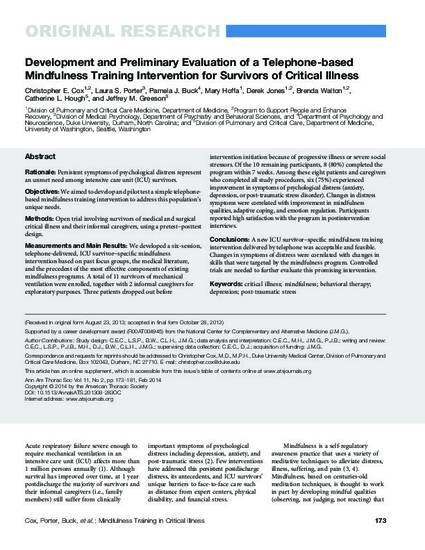
Rationale: Persistent symptoms of psychological distress represent an unmet need among intensive care unit (ICU) survivors.
Objectives: We aimed to develop and pilot test a simple telephone-based mindfulness training intervention to address this population’s unique needs.
Methods: Open trial involving survivors of medical and surgical critical illness and their informal caregivers, using a pretest–posttest design.
Measurements and Main Results: We developed a six-session, telephone-delivered, ICU survivor–specific mindfulness intervention based on past focus groups, the medical literature, and the precedent of the most effective components of existing mindfulness programs. A total of 11 survivors of mechanical ventilation were enrolled, together with 2 informal caregivers for exploratory purposes. Three patients dropped out before intervention initiation because of progressive illness or severe social stressors. Of the 10 remaining participants, 8 (80%) completed the program within 7 weeks. Among these eight patients and caregivers who completed all study procedures, six (75%) experienced improvement in symptoms of psychological distress (anxiety, depression, or post-traumatic stress disorder). Changes in distress symptoms were correlated with improvement in mindfulness qualities, adaptive coping, and emotion regulation. Participants reported high satisfaction with the program in postintervention interviews.
Conclusions: A new ICU survivor–specific mindfulness training intervention delivered by telephone was acceptable and feasible. Changes in symptoms of distress were correlated with changes in skills that were targeted by the mindfulness program. Controlled trials are needed to further evaluate this promising intervention.
Cox, C. E., Porter, L. S., Buck, P. J., Hoffa, M., Jones, D., Walton, B., . . . Greeson, J. M. (2014). Development and preliminary evaluation of a telephone-based mindfulness training intervention for survivors of critical illness. Annals of the American Thoracic Society, 11(2), 173-181.

Author manuscript from PubMed Central.
PMCID: PMC3972971